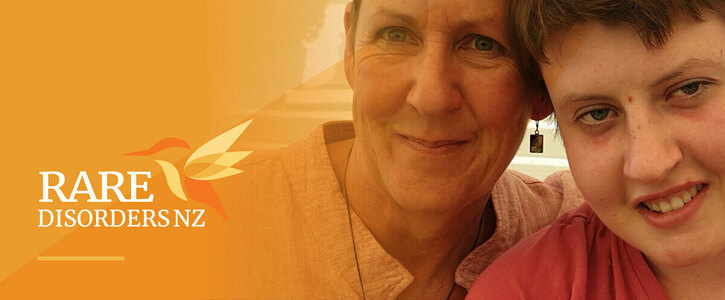We, the undersigned, urge you to acknowledge the universal challenges faced by people living with a rare disease, and the unfairness within the current system, by committing to the development of a New Zealand National Rare Disorder Framework.
Why is this important?
“No country can claim to have achieved universal healthcare if it has not adequately and equitably met the needs of those with rare diseases.”
Helen Clark, United Nations
Sue Haldane, a mother of a child with a rare disorder (22q Deletion Syndrome), has spent 17 years dealing with barriers within our health system to ensure her daughter Lizzie’s needs are met. Now Sue is determined that the journey will be easier for future generations of New Zealanders living with a rare disorder – currently around 6% of the population, or 300,000 people.
“I would make no changes to Lizzie’s lovely self, but I crave many, many changes to the world she lives in,” says Sue.
Despite the low prevalence of each rare disorder (defined as a health condition that affects 1 in 2,000 people or less), collectively they affect many families, with 1 in 17 people living with a rare health condition – more than those diagnosed with diabetes.
Sue is leading the Rare Disorders NZ collective petition to Parliament, calling for the establishment of a National Rare Disorder Framework. Despite the range of rare health conditions, the rare disorder community encounter many common barriers within our health system, including access to care, medicines and support.
New Zealanders would be shocked to learn that we lag far behind most OECD countries in supporting people living with rare disorders and their families to access the best healthcare. Australia announced support of a national plan for rare disorder patients in late 2018, ensuring that no one is left behind. New Zealand needs inclusive policies which acknowledge barriers for the thousands of vulnerable children, adults and their caregivers who continue to fall through the cracks.
We believe a shift in mindset is needed for rare disorders to stop being considered in isolation, and instead to be regarded as a significant factor within health policy frameworks. This is in alignment with the global rare disorder movement headed by Rare Disease International.
It’s time for New Zealand to take rare disorders seriously to ensure equitable health outcomes for everyone. Rare is part of our communities and deserves a fair go.
[Statement from UN Development Programme Administrator Helen Clark to the International Conference on Rare Diseases & Orphan Drugs, Cape Town, 20 October 2016.]


